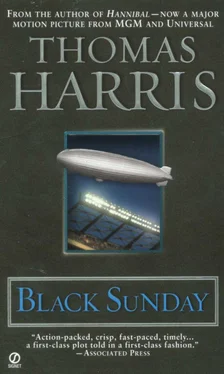Lander felt very much alone now, and he was conscious of his white body and his ugly hand as he walked out on the hot concrete. He put his valuables in a wire basket and checked them with the attendant, tucking the plastic check tag in his swimsuit pocket. The pool was an unnatural blue and the light danced on it, hurting his eyes.
There are a lot of advantages in a swimming pool, he reflected. Nobody can carry a gun or a tape recorder; nobody can be fingerprinted on the sly.
He swam back and forth lazily for half an hour. There were at least fifteen children in the pool with a variety of inflated seahorses and inner tubes. Several young couples were playing keepaway with a striped beach ball, and one muscle-bound young man was anointing himself with suntan oil on the side of the pool.
Lander rolled over and began a slow backstroke across the deep end, just out of range of the divers. He was watching a small, drifting cloud when he collided with a swimmer in a tangle of arms and legs, a girl in a snorkel mask who had been kicking along, apparently watching the bottom instead of looking where she was going.
“Sorry,” she said, treading water. Lander blew water out of his nose and swam on, saying nothing. He stayed in the pool another half hour, then decided to leave. He was about to climb out when the girl in the snorkel mask surfaced in front of him. She took off the mask and smiled.
“Did you drop this? I found it on the bottom of the pool.” She was holding his plastic check tag.
Lander looked down to see that the pocket of his swimsuit was wrong side out.
“You’d better check your wallet and make sure everything is there,” she said and submerged again.
Tucked inside the wallet was the money order he had sent to Beirut. He gave his basket back to the attendant and rejoined the girl in the pool. She was in a water fight with two small boys. They complained loudly when she left them. She was splendid to see in the water, and Lander, feeling cold and shriveled inside his swimming trunks, was angered at the sight.
“Let’s talk in the pool, Mr. Lander,” she said, wading to a depth where the water lapped just below her breasts.
“What am I supposed to do, shoot off in my pants and spill the whole business right here?”
She watched him steadily, multicolored pinpoints of light dancing in her eyes. Suddenly he placed his mangled hand on her arm, staring into her face, watching for the flinch. A gentle smile was the only reaction he saw. The reaction he did not see was beneath the surface of the water. Her left hand slowly turned over, fingers hooked, ready to strike if necessary.
“May I call you Michael? I am Dahlia Iyad. This is a good place to talk.”
“Was everything in my wallet satisfactory to you?”
“You should be pleased that I searched it. I don’t think you would deal with a fool.”
“How much do you know about me?”
“I know what you do for a living. I know you were a prisoner of war. You live alone, you read very late at night, and you smoke a rather inferior grade of marijuana. I know that your telephone is not tapped, at least not from the telephone terminal in your basement or the one on the pole outside your home. I don’t know for certain what you want.”
Sooner or later he would have to say it. Aside from his distrust of this woman, it was difficult to say the thing, as hard as opening up for a shrink. All right.
“I want to detonate twelve hundred pounds of plastic explosive in the Super Bowl.”
She looked at him as though he had painfully admitted a sexual aberration that she particularly enjoyed. Calm and kindly compassion, suppressed excitement. Welcome home.
“You have no plastic, do you, Michael?”
“No.” He looked away as he asked the question. “Can you get it?”
“That’s a lot. It depends.”
Water flew off his head as he snapped back to face her. “I don’t want to hear that. That is not what I want to hear. Talk straight.”
“If I am convinced you can do it, if I can satisfy my commander that you can do it and will do it, then yes, I can get the plastic. I’ll get it.”
“That’s all right. That’s fair.”
“I want to see everything. I want to go home with you.”
“Why not?”
They did not go directly to Lander’s house. He was scheduled for a night-sign flight and he took Dahlia with him. It was not common practice to take passengers on night-sign flights, since most of the seats were removed from the gondola to make room for the on-board computer that controlled the eight thousand lights along the sides of the blimp. But with crowding there was room. Farley, the copilot, had inconvenienced everyone on two previous occasions by bringing his Florida girlfriend and was in no position to grumble at giving up his seat to this young woman. He and the computer operator licked their lips over Dahlia and entertained themselves with lewd pantomimes at the rear of the gondola when she and Lander were not looking.
Manhattan blazed in the night like a great diamond ship as they passed over at twenty-five hundred feet They dropped toward the brilliant wreath of Shea Stadium, where the Mets were playing a night game, and the sides of the dirigible became huge flashing billboards, letters moving down its sides. “Don’t forget. Hire the Vet” was the first message. “Winston. tastes God—” This message was interrupted while the technician cursed and fumbled with the perforated tape.
Afterward, Dahlia and Lander watched while the ground crew at Lakehurst secured the floodlit blimp for the night. They paid special attention to the gondola, as the men in coveralls removed the computer and reinstalled the seats.
Lander pointed out the sturdy handrail that runs around the base of the cabin. He led her to the rear of the gondola to watch while the turbojet generator that powers the lights was detached. The generator is a sleek, heavy unit shaped like a largemouth bass, and it has a strong, three-point attachment that would be very useful.
Farley approached them with his clipboard. “Hey, you people aren’t going to stay here all night.”
Dahlia smiled at him vacuously. “It’s all so exciting.”
“Yeah.” Farley chuckled and left them with a wink.
Dahlia’s face was flushed and her eyes were bright as they drove home from the airfield.
She made it clear from the first that, inside his house, she expected no performance of any kind from Lander. And she was careful not to show any distaste for him either. Her body was there, she had brought it because it was convenient to do so, her attitude seemed to say. She was physically deferential to Lander in a way so subtle that it does not have a name in English. And she was very, very gentle.
In matters of business it was quite different. Lander quickly found that he could not browbeat her with his superior technical knowledge. He had to explain his plan in minute detail, defining terms as he went along. When she disagreed with him it was usually on methods for handling people, and he found her to be a shrewd judge of people and greatly experienced in the behavior of frightened men under pressure. Even when she was adamant in disagreement she never emphasized a point with a body movement or a facial expression that reflected anything other than concentration.
As the technical problems were resolved, at least in theory, Dahlia could see that the greatest danger to the project was Lander’s instability. He was a splendid machine with a homicidal child at the controls. Her role became increasingly supportive. In this area, she could not always calculate and she was forced to feel.
As the days passed, he began to tell her things about himself—safe things that did not pain him. Sometimes in the evenings, a little drunk, he carped endlessly about the injustices of the Navy until she finally went to her room after midnight, leaving him cursing at the television. And then one night, as she sat on the side of his bed, he brought her a story like a gift. He told her about the first time he ever saw a dirigible.
Читать дальше












